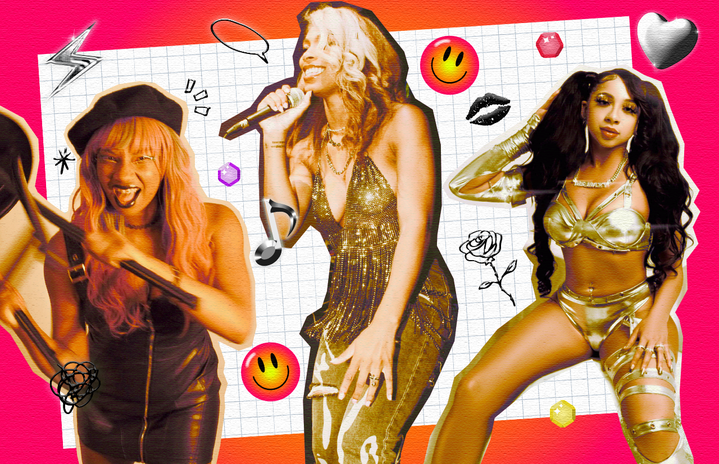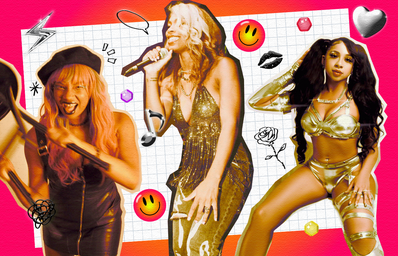Rap is, by technical definition, the delivery of rhymes and poetry to the sound of musical beats. Although initially written off as a fad, the genre was created during the ’70s, when the Master of Ceremonies (or MC) would talk to their audiences in sync with the music to keep them engaged. In between the songs and through the decades, rap has been carried out across generations as an art form that’s continuously evolving.
In a predominantly male industry, female rappers are writing their truth to change the game. The storytelling and socially-conscious lyrics of icons like MC Lyte, Sha-Rock, Missy Elliot, Queen Latifah, and Salt-N-Pepa transcended the years and helped pave the way for other underrepresented creatives. Fast forward to today, and we’ve got the talent of female artists like Nicki Minaj, Megan Thee Stallion, Cardi B, Flo Milli, and more dominating the charts.
Her Campus talked to three upcoming female collegiate rappers about empowerment, their ambitions, and — of course — a whole lot of music.
Brittney Bella, 22, Florida A&M University
“At first, it hurt my feelings,” upcoming Florida rapper Brittney Bella says about her family’s reaction to her dream of becoming a rapper. “My family is not made of artists or really open to that realm, and so my granny would always say, ‘You’re chasing pipe dreams!’ But then I thought: Make it a name.” And she did.
Bella’s first mixtape, Pipe Dreams, was released on March 31, 2022. Although her connection to music is much older (she wrote her first songs at the age of 8), the record was the first time she let the world in on her sound.
“Up to [quarantine], I wasn’t rapping for, like, a year and a half. I had a [university] project in 2019 that I was supposed to rap on but was taken off [by my colleagues] with no warning,” Bella says. “That really shot down my confidence. But I thought, this has always been my passion, so let me actually try.”
But there were still other roadblocks in her journey to music. Not only is she working towards a degree that is very different from music (physical therapy, to be exact), Bella is also from the Bible Belt — a predominantly conservative region of the South. And, in her experience as a Southern woman, the rapper says that she often felt as if people were trying to put her in a box and expecting her to act a certain way.
Coming from a Christian background also meant a struggle with her own identity. Growing up queer, Bella says a lot of her questioning surrounding femininity and sexuality came from a place of “the self-hating thing.”
“I didn’t really accept my sexuality because I was always told it was wrong,” she recalls. “So, with music, I was finally able to be loud and proud and wasn’t in denial anymore. When I finally put it out, I was able to be like — yes, I’m queer and that’s fine.”
Rapping about mental health, empowerment, being weird and, of course, being a college kid (“I really don’t rap about having a whole bunch of money!”), Bella says her lyrics aren’t based on what’s making it big in the industry. But Bella owns that, and sees it as a strength. “With my music, I’m not constrained by what people think I should be.”
To Bella, dreams are simply not a matter of chance. Rather, they’re a game. “A game of how bad you want it — and how bad you are willing to fight for it,” she says.
Kylie Go Brazy, 20, Pratt Institute
“I say a few sex lines occasionally [in my raps] because, I mean, who isn’t having it?” jokes rapper and songwriter Kylie Go Brazy. But, to her, it’s a big misconception that female rappers always talk about something sexual or about their bodies in their songs. “If you actually listen,” she says, “you’ll find that there’s a lot of different things, like real life, positive sh*t, and negative, too.”
Despite living in eight states so far (by the age of 20, mind you), the New York-based artist says places don’t really move her — inspiration for her songs comes about in the weirdest of ways. Diagnosed with depression, anxiety, and panic attacks, Kylie says she started writing poetry in the sixth grade as a way to let out negative feelings and words she wouldn’t necessarily want to say out loud.
“Because of that, I realized the weight words carry,” Kylie says. “This understanding impacts what I put in my music, so I’m really trying to focus on creating hard, relatable bars that express whatever I’m feeling in that moment.”
And, while a lot of her unreleased work discusses bullying and other heavy subjects, Kylie says she’s leaned into letting out positive emotions in her music. To her, it’s about bringing the good things in her life into the world in a creative way, and hopefully, it’ll make people feel good about themselves. “I want to inspire rather than dwell,” Kylie adds.
Working towards her bachelor’s degree in architecture at Pratt Institute, Kylie learned how to build a house from the ground up (literally) while also playing basketball and balancing music in her free time. With so much on her plate, Kylie is no stranger to stress. That comes from her personal life as well.
“My brother and uncle are both in prison, and my brother gets out in 2024,” Kylie explains. “So, I feel like I’m [in a] time crunch because I want to be able to have him come back for me and see that I’ve done a lot of things.”
Kylie thrives under pressure, though. And while so many people may have given up at this point, she’s just getting started. “Despite all the stuff that happened in my past, despite the people that died, people that went to prison, and all that, I’m still here. That’s all in my music, too,” Kylie says. “Because this is my life, my world, I just have to go for it. It’s about thinking, ‘What do you want? And what’s stopping you from achieving that?’”
Jiah, 21, Florida A&M University
“There are times where [I’m upset, but] I literally make myself up and record,” rising rap star Jiah says. “It’s like, ‘You’re sad right now, but you’re going to say something that the people need to hear.”
The Atlanta-based musician, born Tajiah Gary, says through her music, people have learned about a new side of her. “I used to be shy as hell, so the fact that I even get up on stage and perform now,” Jiah says, “it blows my mind, to be honest.”
Jiah started rapping a little over a year ago. She’s always been singing, though — a lot of her early works are R&B tracks. Her first song? It was recorded when she was 9. “I actually grew up with a grand piano in my house because of my sister, who’s a music producer. Just hearing her play made me want to learn how,” Jiah remembers. “When she let me make my first song, she helped me record and produce it. Since then, music has been a part of my life.”
Despite her many years of creating music, Jiah says she’s still figuring out her sound. While she honors her R&B roots in more melodic verses, she’s often experimenting with different genres. School has helped her with that. Being enrolled as a music industry major at FAMU, Jiah says, has inspired her to collaborate with other artists: “I’m literally in class with producers and engineers, so… that’s moved me to be more creative.”
Jiah has one message for the world about what she’ll do with her craft: “I’m going to be a superstar.”
Check out the rest of the Her Campus Music Issue here.


